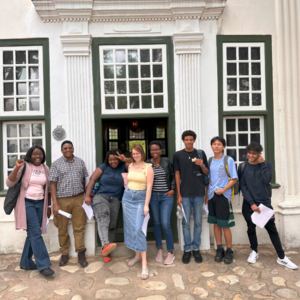Description
Downloadable documents
Presenter
Bruce Khayalethu Blaine developed his love for teaching isiXhosa while completing his PGCE at Stellenbosch University. It was during this time that he realised the necessity for language equity in South Africa and thus has been teaching or tutoring non-mother tongue speakers of isiXhosa for the past ten years. He loves teaching isiXhosa and sharing his culture and roots with others. Our presenters are experts at teaching isiXhosa to non-native speakers and have a practical and interactive approach to learning.
Location
All sessions will be offered in Stellenbosch at the University campus.
After having completed the course successfully, you will be able to do the following in isiXhosa:
- Greet and introduce yourself
- Provide basic personal information such as your name, age, address and telephone number
- Ask and respond to basic questions
- Have a basic conversation with other students
- Communicate socially on a basic level
- Use basic vocabulary related to campus life
We present this course over a period of eight weeks. There is a weekly face-to-face contact time of two hours.
Face-to-face contact time = 16 hours (2 hours per week)
Online activities = 16 hours (2 hours of autonomous learning per week)
The face-to-face time includes authentic and interactive language-use activities during which participants get the opportunity to practise isiXhosa in real-life situations. This is supplemented with four hours of online support and activities.
As part of the course, additional isiXhosa-speaking language experts step in as needed for participants to practice conversation and gain more cultural knowledge.
You should preferably have access to a computer and the internet for the online part of the course. You’ll also need basic computer skills.
This course is aimed at registered SU students. Non-mother tongue speakers of isiXhosa who would like to be able to converse in basic isiXhosa should register for this fun and informal language course.
Click on the ‘Sign up now’ button. This will take you to an MS form for you to sign up for the course. The course coordinator will then contact you with details to register and pay.
A certificate of attendance will be awarded after you’ve completed the course successfully.
Learning a new language can open doors for you. One of the most phenomenal benefits of learning a new language is that people who speak more than one language are able to communicate and interact with many different communities. Furthermore, potential employers consider multilingualism a valuable asset in an employee’s skill set, as multilingual individuals are able to connect with a broader range of people.
The course is free for SU students and includes all course material, refreshments and outings in and around town.
Any questions?
E-mail Helga Sykstus or phone 021 808 4004.




